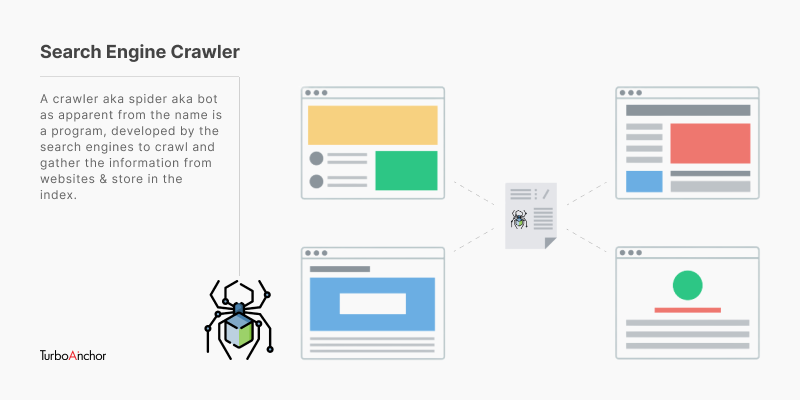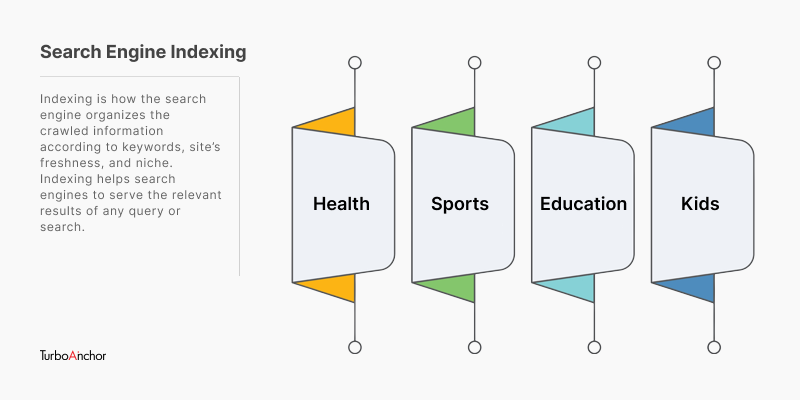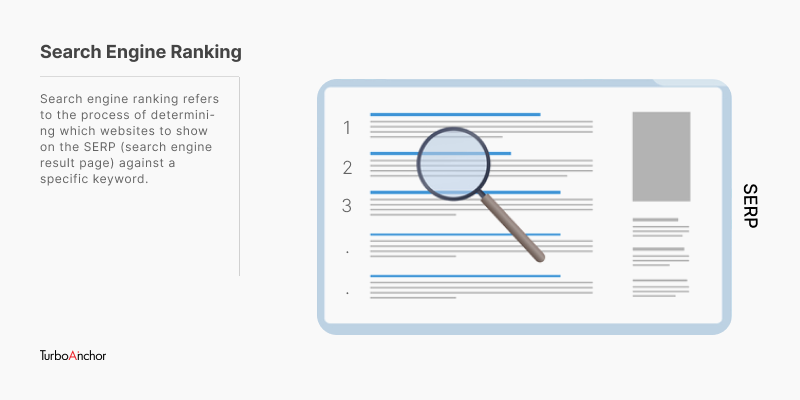What is a search engine?
A search engine is a program that allows users to search online for the information they are looking for on the world wide web. It scans millions of websites through its database, including keywords, page titles, contents, and employs algorithms to rank & display results. Then a search engine results page (SERP) shows results in a hierarchy with the most binding sites in the order of query relevance.
The internet’s first search engine was developed in 1992 by Martijn Koster, known as ‘Aliweb.’ Some of the most popular search engines these days include Google, Yahoo!, Bing, Yandex, and more with Google being the leader. Currently, the search engine market is witnessing exponential growth. Its market value is forecasted to reach USD 55.68 billion by 2025, recording an incredible 25.5% growth rate.[1]
How do search engines work?
Search engines employ three core functions: crawling, indexing, and ranking.
Crawling refers to searching the internet for content and looking for the code of each URL. Indexing means to reserve and classify the data during crawling and ranking orders the data according to its relevance & authority.
What is search engine crawling?
A crawler aka spider aka bot as apparent from the name is a program that is created by the search engines to crawl & gather the information from websites & store in the index. It continues to move from one site to another in order to discover & fetch the data including text, website structure, URLs, images & video. The process starts with the website URL & sitemap submitted by the user, the crawl frequency for any website is determined by the search engine itself & varies from website to website. Also you can also set the crawl rate frequency for Google in Search Console.

What is search engine indexing?
Indexing is how the search engine organizes the crawled information according to keywords, site’s freshness, and niche. Indexing helps search engines to serve the relevant results of any query or search.
You can employ any of the following three search engine indexing features for your website: XML sitemap, request indexing and hosting your content.
An XML sitemap is a file that highlights crucial pages in a website for Google to find and crawl them. Moreover, it enables search engines to comprehend your website’s structure and search its essential pages.
On the other hand, the request indexing tool is used when a website publishes new pages or changes existing pages. It is a component of the URL inspection tool in the Google Search Console.

Finally, you can display your content on Google by creating a website, publishing a blog, an e-commerce website, or making a product/service page. By employing SEO techniques, you could make your content appear in Google SERPS. Likewise, you can use platforms like WordPress, WIX, HubSpot, Joomla, or Google sites to publish your content.
What is search engine ranking?
It refers to the process of determining which websites to show on the SERP (search engine result page) against a specific keyword. All the search engines have developed their own set of instructions called algorithms which determine the best fit results for any search term & rank them accordingly.
Attaining top position for any keyword depends on a number of different factors, from relevancy, website UI/UX, topical/niche authority in fact Google alone has more than 200 known ranking factors.
When a user performs a search, the search engines employ their index to produce relevant results. The organization of data according to its relevance is known as ranking. If you want to promote your content online, you must ensure that it is available to crawlers and can show up in the indexes.

What is a search engine algorithm?
There are close to a billion websites on the internet. Consequently, how is it possible to detect which websites are helpful and which ones are not? Search engines like Google, Yahoo, and Bing use a unique algorithm, and each search engine will use a different algorithm.
Accordingly, some individual factors are considered, such as relevant sites are listed on top while unrelated sites are listed at the bottom of the search results. Moreover, each search engine can rank your pages differently because some search engines index recurrently. Algorithms are constantly evolving and are highly classified.
Similarly, search engine algorithms also utilize off-page factors such as click-through measurement and click-through rates to ascertain a page’s importance. Websites lacking these factors are usually not listed in search engine rankings.
Conclusion
In a nutshell, search engines act as filters for countless pieces of information available on the internet. They gather, organize & rank information from the world wide web to display the most helpful results against any search. As general users, depend on search engines to search for the information they seek.
Frequently Asked Questions (FAQ’s)
How many types of search engines are there?
There are 3 distinct types of search engine. crawler based, human powered and hybrid search engines.
Crawler based search engines such as google create their own index and listings automatically.
Human powered search engines also known as open directory systems depend upon human based activity for listings.
Hybrid search engines use both crawler and manual indexing for listing websites. Google uses crawler as a primary and human powered directories as a secondary mechanism.
What is the difference between a browser and a search engine?
In simple words, search engines are the kind of websites through which a user a can search for available content on the internet, whereas a browser uses search engines to fetch and view the content available on the world wide web.
References:
[1] “Global Next Generation Search Engines Market (2020 to 2025) – Growth, Trends, and Forecasts – ResearchAndMarkets.com.”